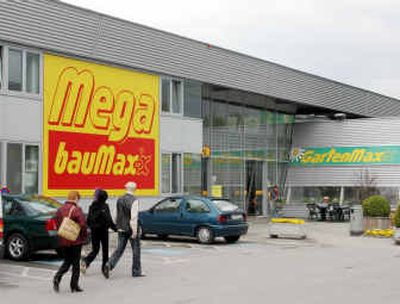Firm drops reference to death camp

VIENNA, Austria – One of Austria’s biggest houseware chains found itself with unwanted publicity Tuesday after protesters complained its summer catalog lists a toolshed as the “Mauthausen” model, the same name as one of the worst Nazi concentration camps.
Karlheinz Essl, the bauMax chain’s chief executive officer, expressed “deepest regret” at what he called an oversight and said the shed would be renamed the “Linde” – or Linden tree. He said tens of thousands of catalogs at the company’s stores were being recalled and the offending name crossed out.
“We are sorry that we used this historically burdened name,” he told the Associated Press.
The catalog came out in March, but the name of the shed – also suitable for backyard summer sleeping – went unremarked until the Salzburger Nachrichten newspaper reported Tuesday on the complaints of anti-Nazi activists.
Asked about the protest, Essl said the original name was thoughtlessly chosen after company officials decided to name different models for towns and cities where bauMax has branches – among them Mauthausen, in Upper Austria province.
But activists said at least some of the company’s employees were aware of the significance of the name and its association with forced labor and Nazi gas chambers.
One critic, Gerold Gruber, said a young man at the information desk of a bauMax branch in Salzburg grinned and said “that’s our gas house,” when asked about the item.
Essl said he opposed such sentiments “in such a strong way that I cannot believe someone would say something like that.”
More than 110,000 people died within the bleak stone walls of Mauthausen and its 47 subsidiary camps between 1938 and 1945. It was the last big Nazi death camp still operating when the U.S. Third Army’s 11th Armored Division arrived in early May 1945.
Many prisoners were killed by gassing, shooting, hanging or beating, but Nazi guards mostly worked inmates to death in an adjacent quarry. Others died of sickness and as a result of medical experiments.
The controversy over the shed broke less than two weeks before survivors and anti-war activists plan to gather by the tens of thousands at the Mauthausen camp to commemorate the 60th anniversary of its liberation by U.S. troops at the end of World War II.
Marco Feingold, head of Salzburg’s Jewish community and a former concentration camp inmate, called the shed’s name “morally unacceptable.”
Robert Eitner, of the Mauthausen Actions Committee in Upper Austria province, welcomed the apology, but said naming the shed after the camp was an “unexplainable stupidity.”
“The fact that such a name appears in a catalog shows that there are huge deficits in (Austria’s) historic consciousness,” he said.
After years of denial, Austria has turned in the past two decades from depicting itself as a victim of Adolf Hitler to acknowledging its role in the Holocaust.
The government has paid hundreds of millions of dollars in compensation to Nazi victims or their offspring, and political and church leaders routinely speak out against anti-Semitism and other forms of intolerance that fed the rise of Hitler in this country and Germany.
Still, Joerg Haider led the rightist Freedom Party into the government in 2001 with populist rhetoric sometimes tinged with anti-Semitism. And a poll last year said more than a third of Austrians believe the Nazi era was in some ways positive.